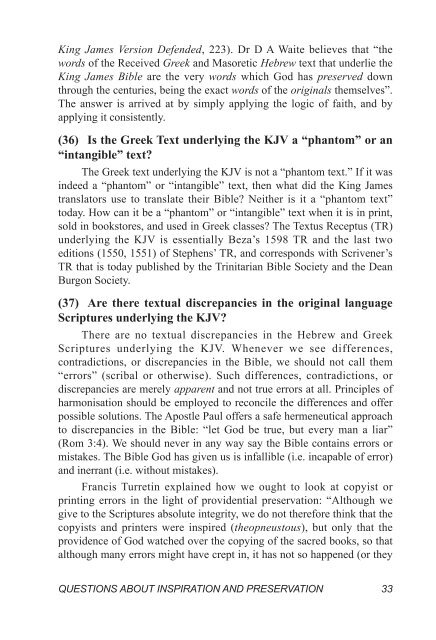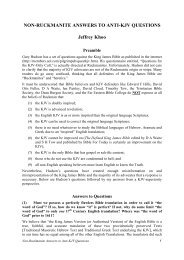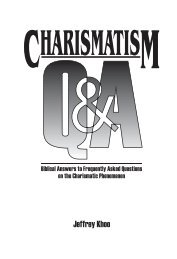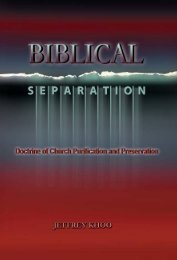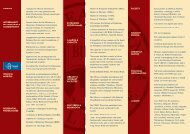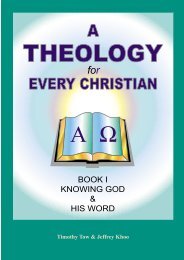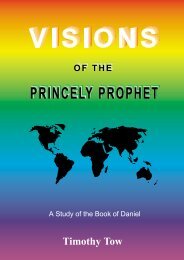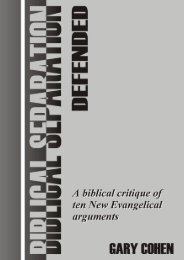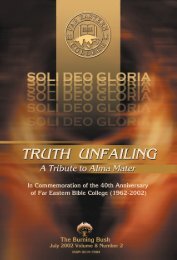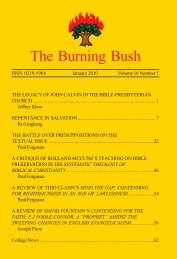KJV Questions and Answers - Far Eastern Bible College
KJV Questions and Answers - Far Eastern Bible College
KJV Questions and Answers - Far Eastern Bible College
- No tags were found...
You also want an ePaper? Increase the reach of your titles
YUMPU automatically turns print PDFs into web optimized ePapers that Google loves.
King James Version Defended, 223). Dr D A Waite believes that “thewords of the Received Greek <strong>and</strong> Masoretic Hebrew text that underlie theKing James <strong>Bible</strong> are the very words which God has preserved downthrough the centuries, being the exact words of the originals themselves”.The answer is arrived at by simply applying the logic of faith, <strong>and</strong> byapplying it consistently.(36) Is the Greek Text underlying the <strong>KJV</strong> a “phantom” or an“intangible” text?The Greek text underlying the <strong>KJV</strong> is not a “phantom text.” If it wasindeed a “phantom” or “intangible” text, then what did the King Jamestranslators use to translate their <strong>Bible</strong>? Neither is it a “phantom text”today. How can it be a “phantom” or “intangible” text when it is in print,sold in bookstores, <strong>and</strong> used in Greek classes? The Textus Receptus (TR)underlying the <strong>KJV</strong> is essentially Beza’s 1598 TR <strong>and</strong> the last twoeditions (1550, 1551) of Stephens’ TR, <strong>and</strong> corresponds with Scrivener’sTR that is today published by the Trinitarian <strong>Bible</strong> Society <strong>and</strong> the DeanBurgon Society.(37) Are there textual discrepancies in the original languageScriptures underlying the <strong>KJV</strong>?There are no textual discrepancies in the Hebrew <strong>and</strong> GreekScriptures underlying the <strong>KJV</strong>. Whenever we see differences,contradictions, or discrepancies in the <strong>Bible</strong>, we should not call them“errors” (scribal or otherwise). Such differences, contradictions, ordiscrepancies are merely apparent <strong>and</strong> not true errors at all. Principles ofharmonisation should be employed to reconcile the differences <strong>and</strong> offerpossible solutions. The Apostle Paul offers a safe hermeneutical approachto discrepancies in the <strong>Bible</strong>: “let God be true, but every man a liar”(Rom 3:4). We should never in any way say the <strong>Bible</strong> contains errors ormistakes. The <strong>Bible</strong> God has given us is infallible (i.e. incapable of error)<strong>and</strong> inerrant (i.e. without mistakes).Francis Turretin explained how we ought to look at copyist orprinting errors in the light of providential preservation: “Although wegive to the Scriptures absolute integrity, we do not therefore think that thecopyists <strong>and</strong> printers were inspired (theopneustous), but only that theprovidence of God watched over the copying of the sacred books, so thatalthough many errors might have crept in, it has not so happened (or theyQUESTIONS ABOUT INSPIRATION AND PRESERVATION33


